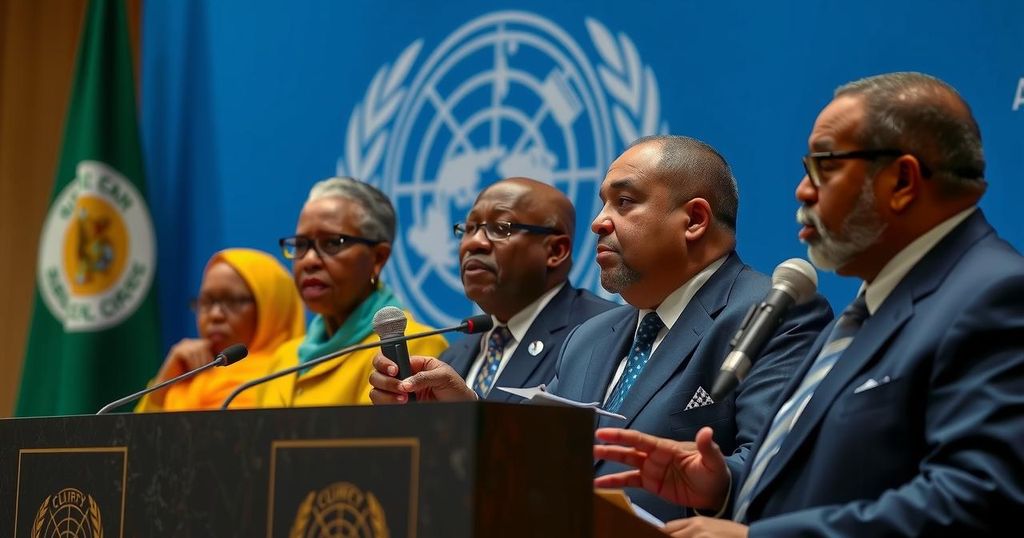COP29 concluded with a controversial climate finance goal of $300 billion USD, falling short of the $1.3 trillion needed for climate-vulnerable communities. African leaders, including representatives from Greenpeace Africa, condemned this agreement as inadequate and a form of climate colonialism. There are calls for genuine climate action and sustainable development in light of the historical injustices faced by these communities, with a commitment to advocate for climate justice at future conferences.
The recently concluded UN Climate Change Conference (COP29) has elicited strong condemnation from African leaders who view the newly established public climate finance goal of $300 billion USD as a betrayal. This amount starkly contrasts with the requisite funding of 1.3 trillion USD needed to support climate-vulnerable communities worldwide. Fred Njehu, a notable Pan-African Political Strategist with Greenpeace Africa, criticized the Global North’s insufficient financial commitment as not merely inadequate but an affront to Africans grappling with the repercussions of climate disasters. He asserted that this financial provision epitomizes climate colonialism, as wealthier nations amass profits while offering mere trifles to those most affected by the climate crisis.
Njehu further remarked that this situation exemplifies historical injustices perpetuated by wealthier nations that have historically profited from fossil fuels, expecting developing countries to bear the burdens of their detrimental actions with minimal compensation. As African nations face challenges such as drought and flooding, he emphasized the urgency of holding polluters accountable, stating that their hollow promises would not alleviate the suffering endured by displaced communities.
Dr. Lamfu Yengong of Greenpeace Africa articulated her concerns regarding the agreement on carbon market mechanisms. She characterized these agreements as neo-colonial tactics, asserting that Africa’s forests are increasingly seen as mere carbon offsets for Western polluters. Yengong expressed a firm rejection of allowing Africa’s natural resources to be exploited for carbon trading at the expense of genuine sustainability and community welfare. She advocated for a pathway towards COP30 that prioritizes sustainable development and recognizes the intrinsic value of Africa’s ecosystems.
Jasper Inventor, head of Greenpeace’s delegation at COP29, described the agreed finance goal as profoundly inadequate, overshadowed by the overwhelming need for more robust climate action. He condemned the fossil fuel industries and their influence on governmental policies, asserting the necessity to eliminate corporate lobbying in climate discussions to align with meaningful efforts against climate change. Despite prevailing despair, Inventor affirmed the commitment to continue advocating for climate justice and appropriate financial allocations as the world looks ahead to the next climate conference in Belem.
The sentiments expressed at COP29 underline a crisis of equity in global climate finance, with African leaders demanding accountability and justice from wealthier nations while emphasizing the need for sustainable solutions moving forward. Their unyielding spirit serves as a testament to their resolve in the face of adversity, as they prepare to champion their cause at future forums.
The UN Climate Change Conference, known as COP29, took place in Baku, Azerbaijan, where leaders from around the world gathered to negotiate ways to address climate change. A significant focus of the conference was on financial commitments from developed countries to assist developing nations in coping with climate impacts. The collaboration sought to bridge the disparity between the financial needs of climate-vulnerable communities and the actual pledges made, especially from affluent nations historically responsible for greenhouse gas emissions. Calls for greater accountability and support were particularly emphasized by African leaders due to their disproportionate suffering from climate-related disasters.
The outcomes of COP29 have prompted resounding criticism from African leaders, who view the financial commitments made as grossly insufficient and emblematic of continued climate colonialism. As they prepare for future discussions, the African continent remains united in demanding that rich nations fulfill their obligations to combat climate change and support vulnerable communities. The ongoing struggle for climate justice emphasizes the vital role that equitable financial assistance plays in mitigating the effects of climate disasters and fostering sustainable development across affected regions.
Original Source: www.greenpeace.org







